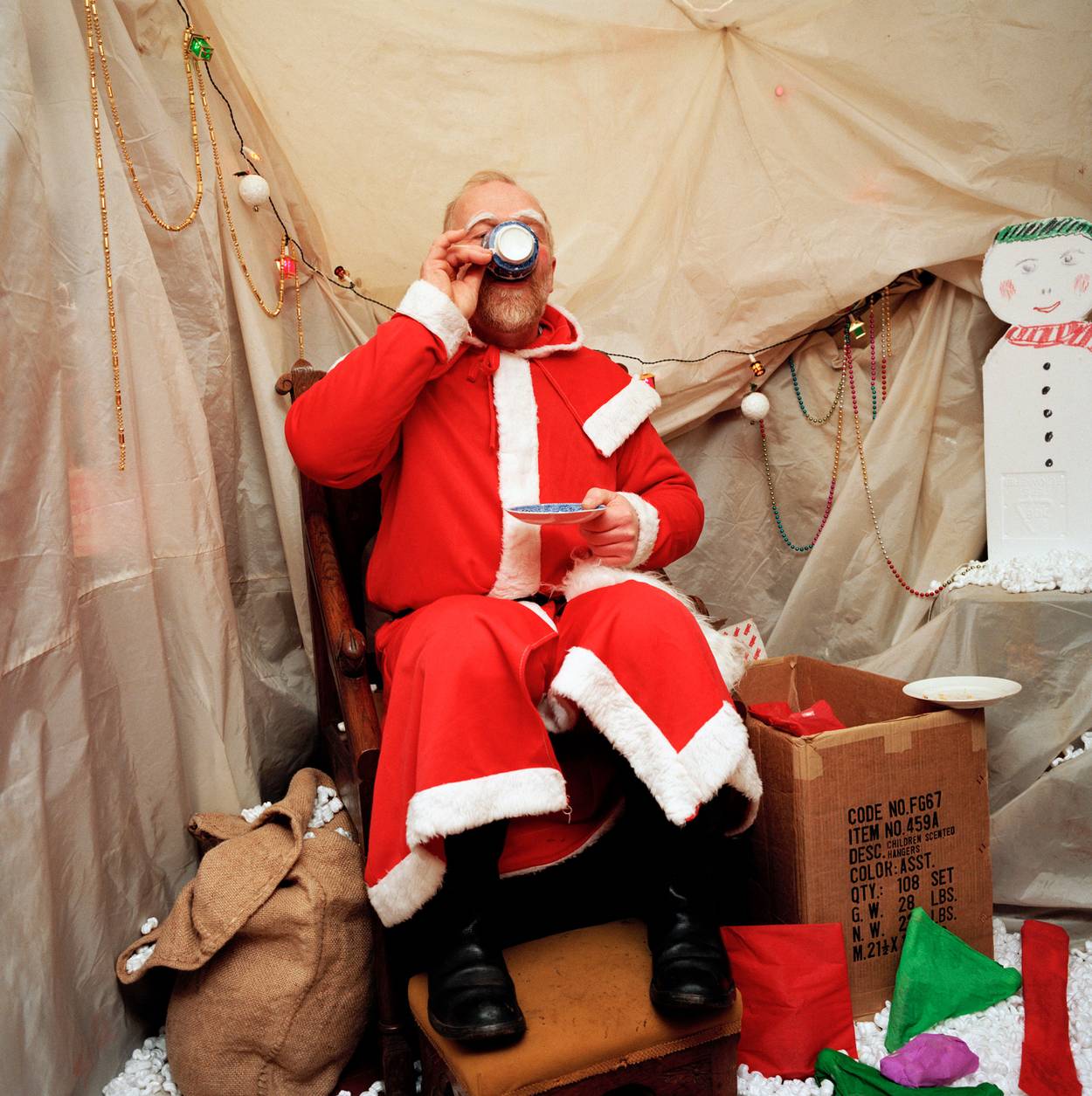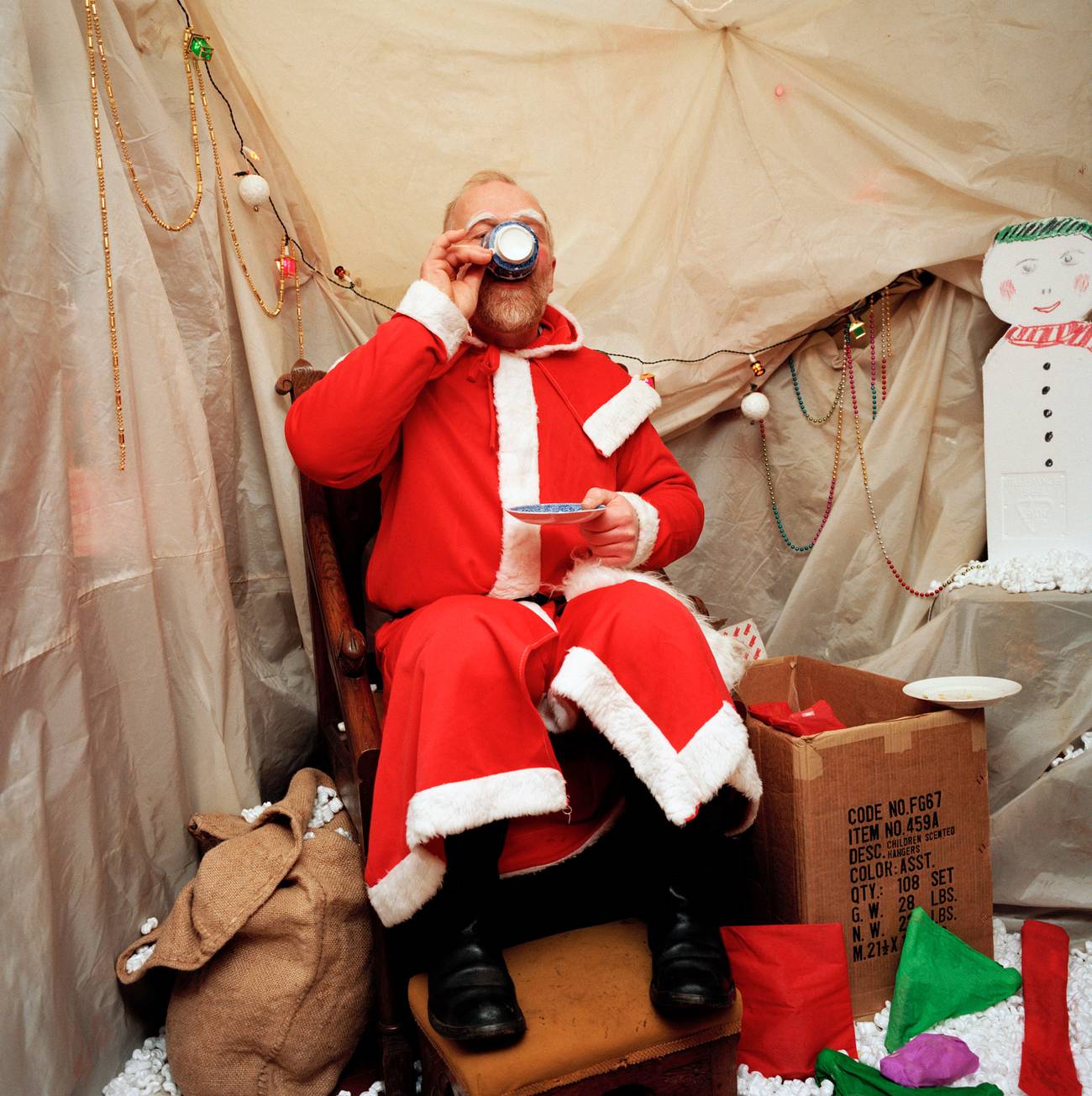A Jewish Christmas in Manchester
Celebrating the holiday of schmaltz

© Martin Parr/Magnum Photos

© Martin Parr/Magnum Photos

© Martin Parr/Magnum Photos

© Martin Parr/Magnum Photos
Even without the red suit and snowy beard, my father looked like Father Christmas. He was the right height, had the right girth, possessed a range of benign expressions and enjoyed the appreciation of children for whom he loved performing party tricks. Which meant he was busy, even in the Jewish neighborhood we lived in, attending parties and distributing gifts from about the beginning of Chanukah to whenever we estimated it was time to take the Xmas decorations down. Writing and, in some families, even pronouncing Christmas as Xmas stopped the whole shemozzle becoming too tref. And, though I talk of Xmas “decorations,” in reality they were rarely more than streamers made of crepe paper and a few spiral cardboard mobiles the youngest of us had made at school.
There was, of course no tree. For the Jews of North Manchester a tree was a step too far in the direction of Christology. Years later, when I was experimenting with “marrying out,” my father expressed horror that my wife had brought a Christmas tree into the house. “Just think of it as a big flower,” I said. He shook his head and looked away. “Why would a big flower have an angel sitting on it?” he asked.
“Jews have angels, too,” I reminded him. He didn’t know much Old Testament history but something about an angel with a fiery sword guarding the way back into the Garden of Eden had stayed with him since cheder. “Our angels don’t have sweet expressions,” he said.
Setting angels to one side, I further reminded him that when I was growing up he’d played Father Christmas for the whole street. “That was different,” he insisted. He never explained the difference to me. Not impossibly, he thought Jesus had been nailed to something resembling a Christmas tree, in which case to have had one in the house would have been either to commemorate the crucifixion or to invite being accused of it all over again.
Right or wrong about the tree, my father was surely correct in thinking Father Christmas had no necessary crucifixion associations, though I did once see a photograph of a giant crucified Santa on the roof of a Tokyo department store. Many are the delights of cultural confusion which the miserly charge of “appropriation” denies us.
Writing and, in some families, even pronouncing Christmas as Xmas stopped the whole shemozzle becoming too tref.
I look back on those mongrel days in 1950s Jewish Manchester with great affection. In truth, we could move from Judaism to Christianity with relative ease because we didn’t know a lot about either. By “we” I mean my immediate family—Max Santa Jacobson and his Little Helfers. If faith was a pyramid, we were buried under its base. But we had neighbors who were at the very apex, who were never out of shul, whose children wore yarmulkes and fringes and who went blind davening. And between them and us there was every complexion of conviction and lack thereof. To be a Jew in Manchester in those days meant being whatever we wanted to be so long as we didn’t want to be not Jewish.
Though we poked gentle fun at the fanatically punctilious as they drew their curtains in fear of seeing my father ride by on his sled, we rubbed along—except when it came to the van. My father had no sled but he did, of professional necessity, have a van—a huge, rusting, noisy vehicle which coughed hoarsely every time he tried to start it up and often broke down before he’d driven it out of the street. Letters both begging and threatening were put through our letter box almost every day, cursing the van, calling it an eyesore, a noise-pollutant and a danger to children. Some people said the sale of their houses had fallen through because of it.
To our frum Jewish neighbors the van was even worse than that. It desecrated the Sabbath. But what could we do? Saturday was the busiest market day. My father had no choice but to start revving the engine at about 5 a.m. if he was to have any hope of getting to his market in Nottinghamshire about 80 miles away. Christmas being busier still, he’d revise 5 a.m. down to 4 a.m. Why being woken early on a Shabbes was worse than being woken early on any other day we didn’t know. But I have said that our grasp of Yiddishkeit was at best slender. Mr. Freedlander would bang on his window anyway and shake his bony fist. By way of recompense my father offered to come down his chimney on Christmas morning and leave a sack of toys for the Freedlander boys, Pinchas, Menachem and Hymie. This generous invitation was never taken up.
My father sold swag in his market stall, referred to more respectably as fancy goods. In later years my mother would run a swag shop which she called “Just Fancy.” Fancy was a word that tickled ours. More than anything else, it denoted gaudy, cheap, made behind the Iron Curtain or China, flimsy in manufacture, but somehow beguiling and worth a couple of shillings of anybody’s money if only for the mirth it occasioned. “Cheap Johnny” was the name my father traded under when he wasn’t being Father Christmas. The one persona bled into the other, just as swag bled into Christmas.
In Christmas, swag found itself. I mean no disrespect to Christianity. All religions descend into kitsch in the act of merchandising their narrative. Only think of the electric menorahs and dancing rabbis for sale in the foyers of Israeli holiday hotels. In early November, anyway, as the days darkened, our thoughts turned to festive swag. What would this year hold, we would wonder, waiting for my father to return from the swag warehouses in the East End of London with tinsel hanging off the mirrors of his van.
Whether according to some divine plan or quite by accident, the year of my bar mitzvah saw innovations in holy swag to take the breath away. Not just the usual streamers and fairy lights and wreaths and boxes of stale Moldovan mince pies and crackers that rarely banged when you pulled them and when they did turned out to hold nothing more exciting than paper hats and jokes in Cyrillic script, but also polystyrene plaques of a bleeding-heart Jesus whose innards glowed red if you had the right batteries, 3D reproductions of the Last Supper in which all the diners except Judas looked Mongolian and ate with chopsticks, plaster figurines of the Three Wise Men who had somehow become confused with the Three Wise Monkeys and covered their mouths and eyes and ears when greeting the Baby Jesus. Pietàs that weren’t always sure just who was meant to be cradling whom. And, most intriguing of all, a haloed Virgin riding a reindeer sidesaddle.
Should we have laughed? Were we poking fun at what had been done to a sacred narrative or the narrative itself? The former. For Christmas itself I felt something akin to awe. The carols drifted up from school assembly into the balcony rooms where the Jewish boys were, for their own good and that of the school, routinely sequestered. I felt doubly an alien, neither a Christian nor a Jew, just a melancholy waif shut out in Christina Rossetti’s wonderfully English Bleak Midwinter where “the earth stood hard as iron and the water like a stone,” but not able to take my place there either, and thus twice, thrice, God knows how many times denied, the son of a purveyor of Xmas tat, who didn’t belong here, there or anywhere (for where was home: Manchester? Lithuania? Mongolia with Jesus’ dining companions?) and whose heart was broken in a hundred places.
And then came Christmas day itself, when we ate turkey with chrain and Christmas pudding with smetana, and pulled my father’s shmatte crackers, and listened to the queen’s message on the radio and fell asleep, happy enough, in front of Gian Carlo Menotti’s one-act opera Amahl and the Night Visitors on television.
Since then I have bought into all the cheap commercializations of Christmas I can lay my hands on. The pies, the puddings, the presents, the mangled theology, the schmaltz. And that, for me, is the saving, all-encompassing, marvellously inauthentic word for it. Schmaltz. This year I intend to be in Scotland for the snow that used to fall on Manchester, though does less often now, the snow that is deep and crisp and even but which the Jewish Jesus would never have seen. “I’m dreaming of a schmaltzy Christmas,” I’ll be singing, though if I’ll be dreaming of anything it will be my benevolent, overweight father trying to squeeze himself into the Freedlanders’ chimney with a sack of chametz. And a time—long, long ago—when to be Jewish was very heaven.
Howard Jacobson is a novelist and critic in London. He is the author of, among other titles, J (shortlisted for the 2014 Booker Prize), Shylock Is My Name, Pussy, Live a Little, and The Finkler Question, which won the 2010 Man Booker Prize.